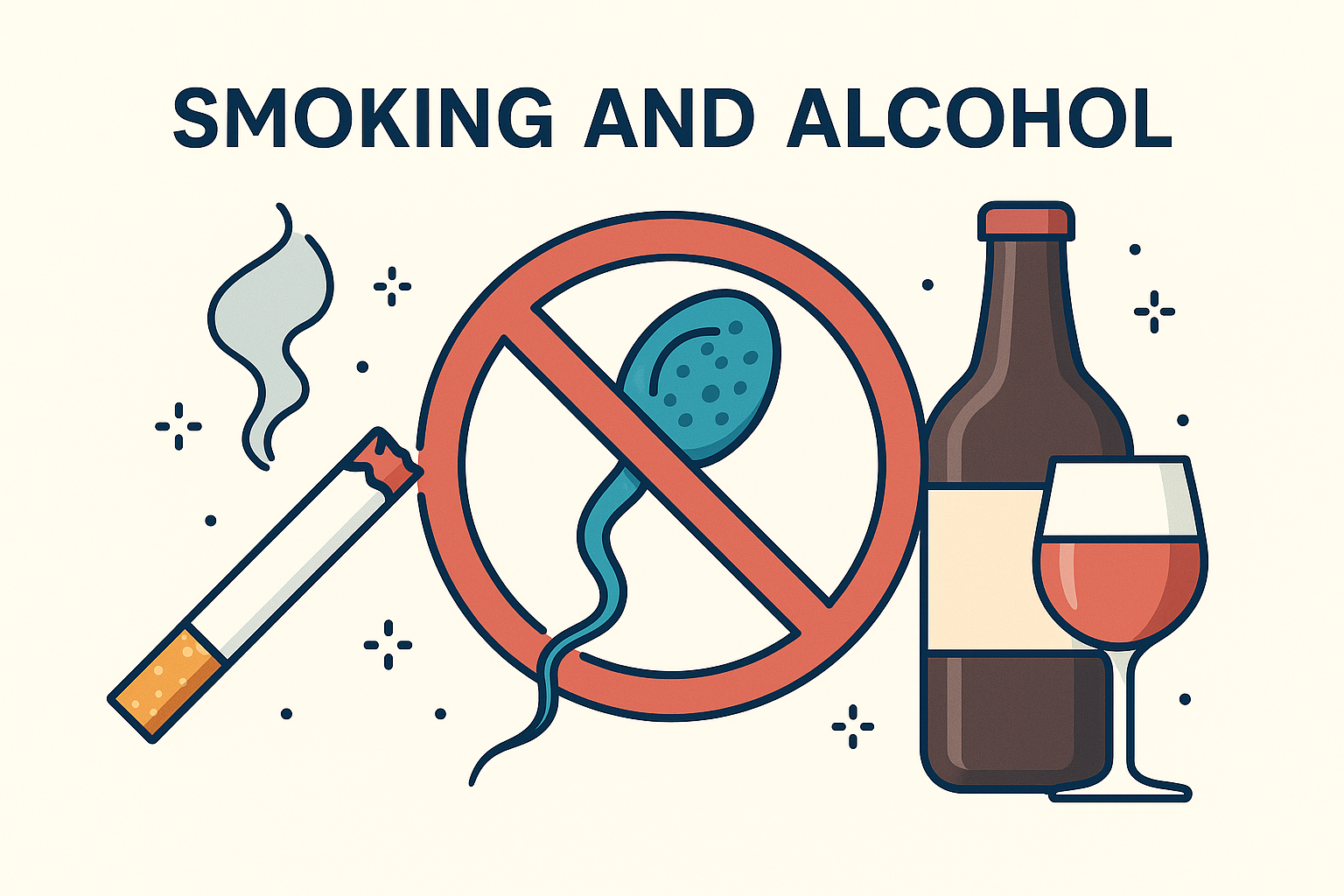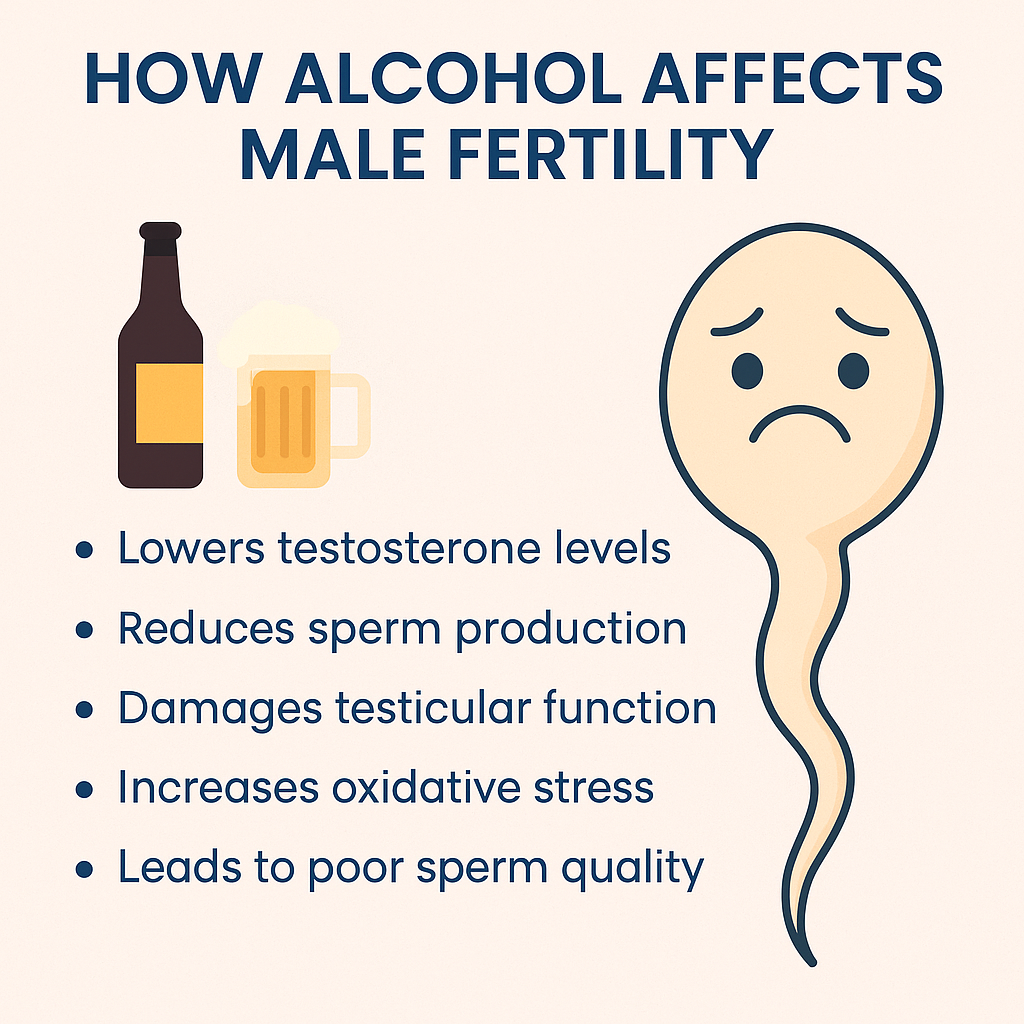
When we hear about infertility, most people immediately think of women. But did you know that male infertility accounts for nearly 40–50% of all infertility cases? For many couples struggling to conceive, lifestyle choices like smoking and alcohol play a much bigger role than they realize.
At Neev IVF Center, Ahmedabad, under the guidance of Dr. Neha Goyal, we meet many men who are shocked to learn that habits they considered “normal” are silently damaging their ability to become fathers. In this blog, we’ll share the facts about how smoking and alcohol affect male fertility—and what you can do to change it.

Fertility is not just a woman’s responsibility. For a pregnancy to happen, men must produce healthy, strong, and motile sperm. Even if the female partner is in excellent health, poor sperm quality can prevent conception.
Key factors for sperm health include:
Both smoking and alcohol harm these factors in different but equally damaging ways.
Smoking is one of the leading causes of male infertility. It lowers sperm count, reduces motility, damages sperm DNA, and increases the number of abnormally shaped sperm. These effects make natural conception difficult and can even reduce IVF success rates. The good news is that quitting smoking can improve sperm health within just 3–6 months, boosting fertility and pregnancy chances.
Smoking doesn’t just harm the lungs—it lowers sperm count significantly. Research shows that smokers often have 23% fewer sperm than non-smokers, lowering natural conception chances. The good news? Once you quit, sperm count improves within months.
Cigarette toxins like nicotine and cadmium slow sperm down, making it harder for them to reach the egg. At Neev IVF Center Ahmedabad, we often see infertility linked directly to poor sperm motility caused by smoking.
Smoking increases the number of abnormally shaped sperm, such as double-headed or misshaped tails. These reduce fertilization chances and often cause IVF failures. Quitting helps restore healthy morphology.
Chemicals in cigarette smoke cause oxidative stress, damaging sperm DNA. This increases miscarriage risks, poor embryo development, and failed IVF cycles. Dr. Neha Goyal has seen many cases where quitting smoking improved IVF outcomes dramatically.
Smoking damages blood vessels, reducing blood flow and leading to erectile dysfunction. This affects intimacy and conception chances. Stopping smoking improves circulation, sexual health, and fertility.
💡 At Neev IVF Center Ahmedabad, we’ve seen men regain fertility within 3–6 months of quitting smoking.
Alcohol may feel like a stress reliever, but it directly harms male reproductive health. Regular drinking lowers testosterone levels, reduces sperm production, and damages testicular function. It also causes oxidative stress, leading to poor sperm shape (morphology), DNA fragmentation, and lower chances of successful conception. Heavy drinking is further linked to erectile dysfunction, reduced libido, and an increased risk of miscarriage or birth defects due to damaged sperm. The hopeful part is that reducing or quitting alcohol can restore hormonal balance and improve sperm health within months, boosting natural conception and IVF success.
Alcohol disrupts testosterone production, which is critical for sperm development. This reduces sperm count and fertility potential.
Heavy drinking damages the testes, lowering testosterone and shrinking sperm production. Many men only realize this after abnormal semen analysis results.
Alcohol causes oxidative stress, leading to DNA fragmentation and misshaped sperm. Even if fertilization happens, damaged sperm can result in miscarriage or failed IVF cycles.
Chronic alcohol use lowers libido, damages blood vessels, and causes erectile dysfunction. This reduces both intimacy and conception chances.
Damaged sperm from alcohol use can pass on genetic issues, increasing the risk of miscarriage or birth defects.
💡 Reducing or quitting alcohol not only restores fertility but also protects the future health of your baby.
One of our patients, Amit (name changed), was 34 years old and trying to conceive for 2 years. His wife’s tests were normal, but semen analysis showed low sperm count and poor motility. He admitted to being a daily smoker and weekend drinker.
With counseling at Neev IVF Center Ahmedabad, Amit quit smoking and reduced alcohol. Within 4 months, his sperm reports improved, and by 6 months, his wife conceived naturally.
He told us:
“I never thought my habits could stop us from having a baby. Quitting was the best decision I ever made.”
At Neev IVF Center, we don’t just treat—we walk with you through every step of your fertility journey.
Yes. Smoking lowers sperm count, motility, and shape while damaging sperm DNA. This makes it harder to conceive naturally and can cause failed IVF cycles. The good news? Sperm health often improves within 3 months of quitting.
Alcohol lowers testosterone, damages testes, and increases oxidative stress. This leads to low sperm count, poor quality, and sexual dysfunction. Reducing or quitting alcohol often restores fertility and hormone balance.
Yes. Even occasional smoking or drinking adds oxidative stress and DNA damage to sperm. The risks increase when combined with other lifestyle issues like stress, poor diet, or obesity.
Absolutely. Sperm take about 74 days to regenerate. Within 3–6 months of quitting smoking and alcohol, sperm count, motility, and DNA quality improve significantly—boosting natural conception and IVF success rates.
In addition to quitting smoking and alcohol: eat antioxidant-rich foods, exercise, maintain a healthy weight, reduce stress, avoid recreational drugs, and schedule semen analysis. At Neev IVF Center Ahmedabad, we create personalized fertility plans to help men restore and protect their reproductive health.
Male fertility is just as important as female fertility. Smoking and alcohol don’t just harm overall health—they directly damage sperm and reduce conception chances. The encouraging news is that the damage is often reversible with lifestyle changes.
At Neev IVF Center Ahmedabad, Dr. Neha Goyal and her team encourage men to take control of their fertility health. Parenthood is a shared journey, and small lifestyle changes today can make the biggest difference tomorrow.
👉 Your dream of fatherhood starts with healthier choices—and we’re here to help.
